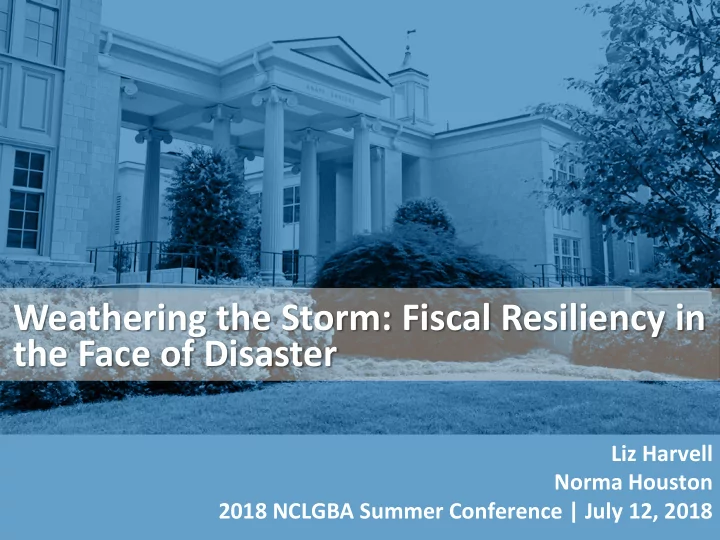

Weathering the Storm: Fiscal Resiliency in the Face of Disaster Liz Harvell Norma Houston 2018 NCLGBA Summer Conference | July 12, 2018
Part 1: Tips and Resources for Local Government Financial Preparedness and Resiliency Before Natural Disasters Liz Harvell
efc.sog.unc.edu Dedicated to enhancing the ability of governments and other organizations to provide environmental programs and services in fair, effective, and financially sustainable ways through: Applied Research Teaching and Outreach Program Design and Evaluation How you pay for it matters.
2017: Most Expensive Hurricane Season in U.S. History Source: NOAA
Source: NOAA
Source: https://www.tryondailybulletin.com/2017/10/09/town-of-tryon-assesses-responsedamage-from-sunday-storm/ https://governor.nc.gov/news/state-assistance-will-help-towns-recover-storm-cleanup-costs
2018: Expected to be Just as Expensive, if not Worse…
What have you done to prepare for natural disasters that could affect your community?
PLANNING TIPS AND RESOURCES
Identify Natural Disasters with Prospective Financial Implications for Your Area • Hurricanes • Tornadoes • Floods • Droughts • Wildfires • Snow and ice storms • Other natural disasters specific to your region
Local governments in the Great Lakes region, for example, budget annually for snow removal. http://http://www.regions.noaa.gov/great-lakes/index.php/project/climate-ready-great-lakes/
Incorporate Natural Disaster Resiliency into the Capital Planning Process • Customary extreme weather preparedness = reacting to a disaster • Be proactive!
Know what’s available • Know in advance, before a disaster strikes. • Know what sort of funds are allowed to be used for disaster planning or relief.
The National Flood Insurance Program
Consider a Rainy Day Fund • Unlike a state rainy day fund • Typically not formal structures, unreserved fund balances or budget surpluses • Flexible
Examine Restricted Funds • A tax to support solid waste disposal debris removal expenses • A tax for road maintenance cover cost share expenses for repairing a road after a disaster • A legally restricted emergency or contingency fund
Set a timeline for financial planning • No magic formula • Specific to your region
Resources • Financial Planning for Natural Disasters: A Workbook for Local Governments and Regions National Association of Development Organizations (https://www.nado.org/wp- content/uploads/2014/01/FINAL_ Workbook.pdf)
HAZUS, Federal Emergency Management Agency (https://www.fema.gov/hazus)
• 2018 Tropical Meteorology Project , Colorado State University ( https://tropical.colostate.edu/) • Disaster Preparedness Government Finance Officers Association (http://www.gfoa.org/disaster- preparedness)
• North Carolina Enhanced Hazard Mitigation Plan (https://www.ncdps.gov/document/north-carolina-enhanced- hazard-mitigation-plan) • UNC School of Government Emergency Management Law Microsite (https://www.sog.unc.edu/resources/microsites/nc- emergency-management/)
https://efc.web.unc.edu/
Part 2: FEMA Reimbursement Requirements and Other Post-Disaster Strategies Norma Houston
No One Is Immune From Disasters!
This Year Is Probably No Different https://tropical.colostate.edu/media/sites/111/2018/04/2018-04.pdf
Maximize Recovery By Planning Ahead!
FISCAL PREPARATION MAXIMIZING FISCAL RECOVERY
Sources of Disaster Funding Local Funding State Funding Federal Funding Two main types of FEMA funding assistance: • Individual Assistance (paid to individuals) • Public Assistance (paid to public entities)
FEMA Public Assistance Costs must be: 1. Direct result of federally declared disaster 2. Within designated disaster area 3. Legal responsibility of applicant Source: https://emilms.fema.gov/IS634/PAsummary.htm
Common PA Reimbursement Problems 1. Contracting – not complying with procurement requirements 2. Personnel – overtime compensation without having a pre-existing non-discretionary policy 3. Private property exclusion – reimbursement generally not provided for work on private property 4. Lack of legal responsibility – applicant’s must have the legal responsibility to perform the work 5. Inadequate/no documentation 6. No local state of emergency declaration
Procurement Requirements Uniform Guidance & FEMA Rules Local State Policies Law
Which Rules Do You Follow? “The non-Federal entity must use its own documented procurement procedures which reflect applicable state, local, and tribal laws and regulations, provided that the procurements conform to applicable Federal law and the standards identified in this part.” - 2 CFR § 200.318(a)
Why Is This Important? Noncompliance with state and federal requirements has serious consequences
Noncompliance Consequences Deobligation of Funds State and Payments federal temporarily investigation withheld Fiscal Disaster Recovery Negative work not Publicity reimbursed Debarment Suspending from further federal awards award
Most Common Reimbursement Pitfall Noncompliance with federal procurement requirements most common reason for FEMA PA reimbursement denial OIG found over $500 million in ineligible PA costs due to procurement violations (2015-17)
FEMA Top 10 Procurement Mistakes 1. Bidding requirements 5. Cost-plus contract (noncompetitive 6. Contract clauses contracting) 7. Geographic preference 2. Sole source beyond exigent circumstances 8. M/WBE solicitation 3. Piggybacking 9. No cost/price analysis 4. Time and materials 10. Inadequate/lack of contract documentation Source: https://www.fema.gov/media-library-data/1506978167717- 61cdf0784cbba7f976f8a66700f04f3e/Top_10_FEMA_Grant_Procurement_Mistakes_20170928.pdf
DISASTER PREPARATION PREPOSITION CONTRACTS
Preposition Contracts
What Do You Need to Be Ready? • Identify needs in advance – debris removal, pumping operations, equipment rental, etc. • Competitively bid contracts using most restrictive rule • Save all procurement documents • Multi-year contracts are acceptable, but not unlimited term (recommend 2-3 years max) • Activate contracts when needed
Preposition Contracts Requirements • Follow all applicable procurement requirements • Scope of work should not exceed the anticipated need in future declared disaster • Work performed must be within scope of original contract – modifications to price and scope of work must be approved by FEMA NC Division of Emergency Management is happy to help you!
WRAP-UP
Be Prepared . . . Become familiar with 2 CFR Review relationships with Part 200 nonprofit partners (is an MOU or contract in place? Are you Adopt/update local purchasing monitoring compliance?) policies Bid prepositioned contracts Adopt/update conflict of (debris, equipment, etc.) interest/gift ban policies Develop template bid and Ensure procedures are in place contract documents to fully document procurement processes Coordinate with your local Work with your attorney to emergency manager and develop federal contract purchasing officers provision templates
RESOURCES
NC Division of Emergency Management www.ncdps.gov/Our-Organization/Emergency-Management/
NC DEM Training Site (TERMS) https://terms.ncem.org/TRS/home.do
SOG Purchasing Website www.ncpurchasing.unc.edu
SOG Emergency Management Website www.sog.unc.edu/ncem
FEMA PDAT FEMA Procurement Disaster Assistance Team www.fema.gov/procurement-disaster-assistance-team
CFR Website https://www.ecfr.gov/cgi-bin/text- idx?SID=6214841a79953f26c5c230d72d6b70a1&tpl=/ecfrbrowse/Title02/2 cfr200_main_02.tpl
Thank You and Good Luck! Norma Houston nhouston@sog.unc.edu (919) 843-8930 Liz Harvell lharvell@sog.unc.edu (919) 445-0847
Recommend
More recommend